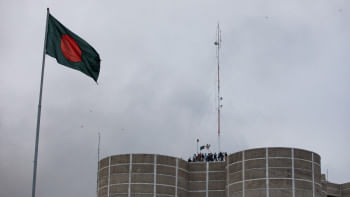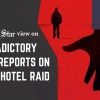Police reform requires more than a change in uniform

For years, the police force has been used as an extension of the ruling party to control political opponents. Unfortunately, during the July uprising, the said opponents were the students and the general public who took to the streets. The abject lack of a moral compass from the leadership of the police, which made them mere puppets of an authoritarian regime, led to the killing of hundreds of civilians on the streets of Dhaka as well as across the country between July 16 and August 5. What followed was a deadly series of mob attacks that saw the killing of a number of law enforcement members across the country and the burning of police stations as they had become symbols of oppression of the previous regime. The topmost priority of the interim government is, of course, bringing the trigger-happy perpetrators in the police force and the members of the police leadership, who issued the order of shooting at civilians, to justice. But what comes after that? How do the general public and the country heal from an experience like this?
Like many other public institutions in the country, the police have also been enfeebled by successive political administrations over the last five decades in favour of political gains at the expense of the general public. Added to that is a general culture of lacking accountability, rampant corruption in recruitment, and overt political inclination. Hence, an overhaul of the police is long overdue. The members of the police force very recently staged a protest and made an 11-point demand to the interim government, which is legitimate and the current government should take it into consideration.
There are arguments as to how this reform should take place. But above all else, what needs to be prioritised is the full resumption of the general operations of the police force to ensure that we don't go back to the utter lawlessness of the days following the fall of the AL government. As praiseworthy as the community volunteerism has been in safeguarding people's lives and assets, it cannot be the way of life in a civilised country. The state has a mandate to provide safety and security to its citizens and the interim government's legitimacy hinges on ensuring it. As far as a long-term reform goes, a veritable change in how the police function needs to be the goal, not just cosmetic changes like updating the colour of the uniform and logos. It goes far deeper than just a branding issue and needs serious soul-searching from the remainder of the leadership of the police, aided by an empathetic home ministry.
Police reform is a complex process and requires independent oversight, strong political will, and support from a coalition of a broad group of stakeholders; the citizens are a crucial part of that process. There are successful global examples of how to initiate that reform, demonstrated by Singapore when they were trying to overcome their own problems of corruption in the 1950s, and also by South Africa in the post-apartheid era. There is no specific playbook to follow, and each country has its own way to achieve its goals, but there are a few steps which the interim government could follow.
First, an independent commission should be set up to provide oversight and investigate corrupt practices in the force. The neutrality and jurisdiction of this commission is critical in curbing corruption and putting an end to the use of the police force for political gains. This could be done by strengthening the Anti-Corruption Commission (ACC), with an added emphasis on the oversight of the police. Second, a lot has been said about improving the salaries and working conditions of police personnel, with very little happening on the ground. There ought to be a fair assessment of compensation and general improvement of working conditions if we are to separate the reputation of corruption from the police.
Third, the recruitment and training process needs to be revised to bring in more focus on integrity, community engagement, and ethical conduct. Finally, bringing the citizens and the police closer through community policing and public engagement is crucial to build trust and responsiveness to the needs of the people. There is an ever-widening trust deficit between the public and the police, further exacerbated by the recent events. A truly responsive and citizen-centric police force cannot function with little to no connection with the communities they serve. Police officers need to be encouraged to engage with the public and work collaboratively with the communities to solve local problems. It's also time to establish an effective public feedback mechanism to encourage reporting of problematic behaviours and concerns by the public.
"The past is a foreign country; they do things differently there," is the immortal opening line from LP Hartley's novel The Go-Between. It should also accurately describe the gulf between what used to happen in Bangladesh up until August 5 and what should happen in the coming days. Let's not cast our minds to the past, sustaining the memories of violence and despair. Now is the time to unite the country, rising above the politics of division and the labels that we all quite comfortably ascribe to people all around us. The police are also our fellow countrymen; let's not shun them due to the action of a small percentage of trigger-happy enforcers. A purge is due in the police force, but let them also heal with the rest of the nation and bounce back from their sclerotic leadership.
Rakib Avi is a development worker and a graduate research assistant at the University of Georgia.
Views expressed in this article are the author's own.
Follow The Daily Star Opinion on Facebook for the latest opinions, commentaries and analyses by experts and professionals. To contribute your article or letter to The Daily Star Opinion, see our guidelines for submission.

 For all latest news, follow The Daily Star's Google News channel.
For all latest news, follow The Daily Star's Google News channel. 










Comments